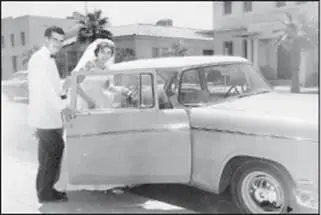But that night, when he got home, Jim said to me, “What say the two of us have a little sit-down.”
I fixed myself a whiskey and water and we sat out in the yard behind the adobe house, where little fruits were starting to come in on the orange trees.
“I wasn’t spying,” I said. “I was just confirming that everything between us was copacetic. I don’t want you cheating on me with that floozy.”
“Lily, I’m not cheating on you. But it’s a part of city life that men are going to find themselves, from time to time, in the company of women who are not their wives. You got to trust me.”
“It’s not that I don’t trust you,” I said. “But I’m not going to stand idly by while some floozy tries to steal my man.”
“Maybe we’re all feeling a little penned up in this city. Maybe it’s making us all a little crazy.”
“Then maybe we should leave,” I said. “Maybe we should.”
“So that’s settled.”
“Now we just got to find us a place to go.”

Rex and Rosemary after their wedding
HORSE MESA WAS Aflyspeck of a place, a glorified camp, really, built for the men who worked at Horse Mesa Dam, which held back the waters of the Salt River, formed Lake Apache, and generated electrical power for Phoenix. Only thirteen families lived in Horse Mesa, but those families had kids, and the kids needed a teacher, and that summer I got the job.
We traded in the fancy but unreliable California Kaiser for a good old made-in-Detroit Ford and, one day in July, packed our suitcases in the trunk and headed east, first to Apache Junction, then up to Tortilla Flats, where the asphalt ended. From there, we followed the Apache Trail, a winding dirt road, up into the Superstition Mountains, which for my money were even sweeter on the eyes than the Grand Canyon. We drove by massive cliffs of red and gold sandstone, their layers of collapsed sediment pushed up at an angle like a bunch of books leaning against one another on a shelf. The mountains were studded with saguaros, stag horns, and prickly pears, which were ugly as hell, but you had to admire their ability to thrive in even the driest, stoniest, most inhospitable cliffside cranny-and darned if they didn’t manage to produce some tasty fruit.
After several miles on the Apache Trail, we came to an even narrower dirt road leading off to the north. We followed it over a ridge and down through a series of sharp, steep switchbacks, passing beneath overhangs and around otherworldly rock formations. Jim was at the wheel, and he made the Ford crawl along, hugging the mountainside, as there was no guardrail and the ground fell away so abruptly on the other side that with one miscalculation, we would plunge into the abyss. The road was called Agnes Weeps, after the town’s first schoolteacher, who had burst into tears when she saw how plunging and twisting the road was and realized how remote the town must be. But from the first moment I laid eyes on it, I loved that road. I thought of it as a winding staircase taking me out of the traffic jams, news bulletins, bureaucrats, air-raid sirens, and locked doors of city life. Jim said we should rename the road Lily Sings.
We followed Agnes Weeps all the way to the bottom of the canyon, then came around a bend and saw a deep blue lake with red sandstone cliff walls rising on all sides around it. Across a short bridge, perched up on one of the cliffs and looking down on that lake, was Horse Mesa. It was just a cluster of stucco houses, and it was remote-Agnes had been right about that. A truck brought in groceries twice a week from the commissary at Roosevelt Dam. There was only one telephone, in the community center. If you wanted to make a phone call, you had to put in a request through the operator at the Tempe substation, who gave you an appointment and, at the designated time, routed the call through Mormon Flats, and everyone at the community center got to hear your conversation.
But from the get-go, we were all darned happy to be at Horse Mesa. Since it was summer, the kids spent the entire day at the lake, diving off the cliffs into the cool water. The river and the lake attracted all sorts of animals, and we saw bighorn sheep, coatimundi cats, Gila monsters, Green Mountain rattlesnakes, and chuckwallas.
Jim got a job with the Bureau of Land Reclamation driving a gravel truck-he filled potholes and rebuilt eroded washes along the entire length of the Apache Trail-and the work made him content. He was riding something powerful, on his own, out in the open.
And I was back where I belonged, in a one-room schoolhouse, with no fish-faced bureaucrats second-guessing me, teaching my students what I thought they needed to know.
THE SCHOOL AT HORSEMesa went only through the eighth grade, so that fall, for the third time, we had to send the kids off to boarding school. We enrolled Rosemary at St. Joseph’s, a small, fancy school in Tucson. I knew that a lot of the other girls came from rich families, so before Rosemary left, I gave her a present.
“Pearls!” she exclaimed when she opened the box. “They must have cost a fortune.”
“I got them with S &H green stamps,” I said. “And they’re not real, they’re fake.” I told her for the first time about my crumb-bum first husband and his other family. “The louse gave me a fake ring,” I said. “But for years I thought it was real and acted like it was, and so did everyone else.” I fastened the pearls around her neck. “The point being,” I said, “if you hold your head up high, no one will ever know.”
With the kids away at school, our life in Horse Mesa settled into a tranquil routine. Part of it was the setting itself. Living there was like living in a natural cathedral. Waking up every morning, you walked outside and looked down at the blue lake, then up at the sandstone cliffs-those awe-inspiring layers of red and yellow rock shaped over the millennia, with dozens of black-streaked crevices that temporarily became waterfalls after rainstorms. During one downpour I counted twenty-seven waterfalls.
Just as important, everyone in Horse Mesa got along. We had to. Since we all worked together and depended on one another, arguments were a luxury none of us could afford. No one complained or gossiped. We only got intermittent radio signals, so in the evening, while the children played, the grown-ups strolled about visiting one another. None of us had much money, so we didn’t talk about the things people with money talked about. Instead, we talked about what mattered to us-the weather, the level of the lake, the big-mouth bass someone had caught under the bridge, the mountain-lion scat someone else had seen along Fish Creek. It may have seemed to city folk that we had precious little to do, but none of us felt that way, and the quiet routine contributed to the tranquility of our little cliffside camp.
Peaceful as our life had become, I still had my moments of high dudgeon. I’d always been interested in politics, but I discovered I actually had a talent for it after the Department of Education tried to close down a couple of schools in our area and I hooked up with the United Federation of Teachers to stop it. I saw how easy it was to get things done if you were willing to use your elbows and your lungs, and how easily cowed some politicians got if you grabbed them by the tie or jabbed them in the chest with your finger.
I started visiting Phoenix regularly, making sure those double-talking politicians followed through on their campaign promises, and on one occasion I burst into the governor’s office, Rosemary in tow, to berate him for not funding the education bill. When he threatened to have me arrested, I said if he did, I-a taxpayer, teacher, and loving mother of two-would hold a press conference and remind everyone what a lying son of a bitch he was.
Читать дальше










